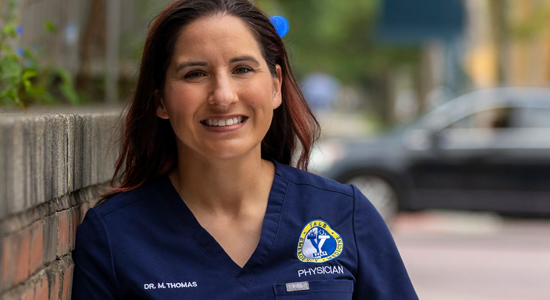Best of Both Worlds
Army-Baylor MBA/MHA program broadens skillsets, lays foundation for leadership
By Justin Walker
The U.S. Army and Baylor University have a long-standing partnership to further military personnel in their education. This includes collaborations with several colleges across Baylor’s campus, including the Hankamer School of Business.
The Army-Baylor University Graduate Program in Health and Business Administration dates back to 1947 as a short course on hospital administration, Teresa Hinnerichs, PhD, program director and assistant professor, said. The program evolved to issue a Master’s degree in 1953. Starting with the 2005-2007 class, Army-Baylor partnered with the School to offer an additional joint MBA/MHA degree. The added degree plan was a significant move due to the different skill set it provides, Hinnerichs said.
“The Masters of Healthcare Administration is an absolutely wonderful degree as it targets the health policy and health sector,” Hinnerichs, who graduated from the MBA/MHA program in 2010, said. “The Masters in Business Administration is an added dimension that gives our students more insight into the business environment with additional classes such as international business, business law topics, and organizational ethics.”
There is a beauty to how the program operates, Hinnerichs said. While offered through the military, it functions like any other graduate-level program offered at other institutions. The difference is the Army-Baylor Program can leverage data case examples and tools from the military health system that makes the program unique, she said.
“We expose our students to the federal health sector in a way that most graduate healthcare management programs don’t,” she said.
The program is not for the faint of heart, Hinnerichs said. The MHA/MBA degree plan consists of 78 credit hours completed through the program’s first year, she said. Students arrive at Fort Sam Houston in San Antonio in June to begin the first of five accelerated semesters before entering the residency portion of the program in July of the following year.
Residency sites are a mix of military and civilian hospital systems, Hinnerichs said. For the 16 students who entered their second year in the summer of 2021, some residencies were established with Kaiser Permanente and the Mayo Clinic, as well as with HCA hospitals and several military hospital sites.
The Army-Baylor MHA and MBA/MHA degrees are unique in their size as well, Hinnerichs said. Army-Baylor regularly has 55 MHA and 30 MBA/MHA students. For the MBA/MHA, this year 25 students applied for graduation in August, 16 students will enter residency in July and 21 students will join the program in June.
One question that gets raised very frequently within the military is why a graduate-level education is offered, Hinnerichs said. The answer is pretty clear to her.
“We want leaders that commit to lifelong learning,” she said. “As military officers, we are very passionate about refining our craft. Graduate-level education broadens the military officer’s skillsets and also develops and refines critical thinking skills. I think those two components are the foundation for leadership.”







